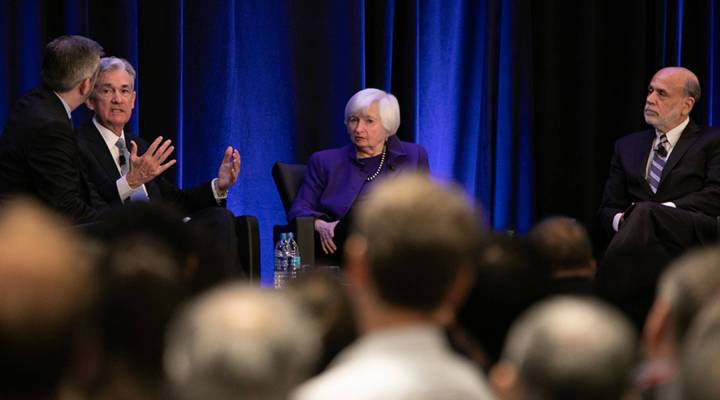
What it is like to be a female economist

Between the #MeToo movement and women’s marches, gender discrimination in the professional environment has become a major topic of conversation. To shed some light on this topic, we spoke with reporter Heather Long of the Washington Post. She attended the American Economics Association annual conference and wrote a piece about what happened at the biggest gathering of economists in the United States. Hint: It was not good. The following is an edited transcript of her conversation with Marketplace host Kai Ryssdal.
Kai Ryssdal: Give me the lay of the land for the American Economics Association meeting. It’s the thing to go to if you’re an economist in this country?
Heather Long: It is. I sometimes try to compare it to the Super Bowl or Oscars of the economics world. Thirteen thousand economists gather for one weekend of crazy networking, research sharing and yes, some drinking. And they pick different cities around the country — this year it was Atlanta — and they always do it the first weekend in January. So I guess they like to keep that New Year’s Eve party going.
Ryssdal: Those fun economists. But look, on a more serious note, your piece in The Post the other day was kind of extraordinary because it lays out a profession and an institution — this conference — that is deeply, deeply troubled in matters relating to #MeToo and to inequality and harassment.
Long: That’s right. I didn’t go there expecting to write about this topic. I will say, Alice Wu’s name comes up a lot, a Ph.D. student now at Harvard, who had done an analysis of a jobs forum where she scanned a million posts and looked for the types of words people were writing about male versus female Ph.D. candidates who were looking for jobs. And for women the top 10 words were all things about their body, about their appearance, their looks, whether or not they had been pregnant yet — that really opened this discussion this year in Atlanta where people wanted to bring this front and center and say, “This is a problem. This is wrong.” And so I was encouraged by that part.
Ryssdal: The amazing part though is there is all this data you talk about, and yet at this conference there are job interviews happening in hotel suites where there are applicants sitting on beds. You read that and you wince. There are panels where co-authors of papers who are women are not on the panels, they’re in the audience keeping track of how much time the male presenter is using. I mean, it’s amazing.
Long: I started walking around this conference for three days, and all of these very unfortunate and seemingly minor sexist moments were happening. So the hotel suites are actually an improvement. A big problem in economics is that they still interview people in hotel bedrooms, and I’ve received a lot of emails about those — these horror stories of sometimes job candidates are sitting on the bed, sometimes the bed was unmade, sometimes there are dirty towels around or the TV is still going on and people are half watching a football game. It’s clearly not the right setup.
Ryssdal: Give me your anecdote about the economist you talked to. You were interested in his research and he gave you an answer. I’ll let you tell the story.
Long: I had a couple of experiences. One, I had actually sat through the presentation — the hourlong or so presentation — and I went up to the scholar afterwards, who was male, and said, “Wow, that was really great. How can I get a copy of that paper? I might want to write about it.” And he gave me his card and said, “Well, go to my website and there is a less math-y version.” Again, I had just sat through the presentation. And it just so happened that a male journalist came up right after me and asked almost the same question and this same male professor said to the male journalist, “Well, you can get the full paper on my website, and you can also get a version for a more general audience.” It’s all these little swipes, the subtle differences of the way that men and women are treated in the economics profession.
Ryssdal: So if economics now as a profession is woke, as it were, and you’ve got the incoming president of the AEA, Janet Yellen, as you point out one of the most famous economists in the world, saying that this is appalling and unacceptable, is there change on the horizon?
Long: I’m encouraged. I have to say, one of the people [in the] situation I describe in this piece that I wrote actually reached out to me and he said, “I think you were talking about me there, and I didn’t actually realize that I had worded [things] differently to the female versus the male journalists, and I’m really sorry that I did that.” And I think there’s a real commitment to trying to make change. And I think the future of the profession, if it’s like that, is very strong.
There’s a lot happening in the world. Through it all, Marketplace is here for you.
You rely on Marketplace to break down the world’s events and tell you how it affects you in a fact-based, approachable way. We rely on your financial support to keep making that possible.
Your donation today powers the independent journalism that you rely on. For just $5/month, you can help sustain Marketplace so we can keep reporting on the things that matter to you.












